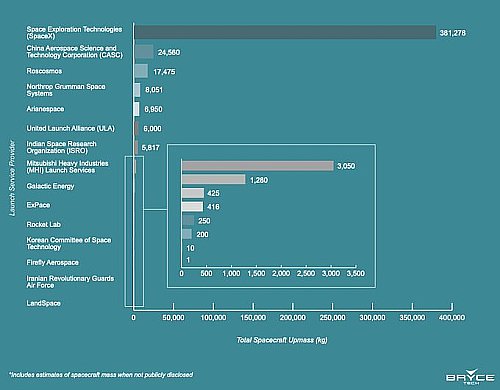Musk touts SpaceX’s gigantic lead in sending mass to orbit in 2023
In a tweet Elon Musk sent out yesterday, he noted that “SpaceX is tracking to launch over 80% of all Earth payload to orbit this year.”
The graphic to the right was included in Musk’s tweet. Despite the delays in developing its heavy-lift Starship/Superheavy rocket, mostly caused by government red tape since the arrival of Joe Biden in the White House, the company’s smaller Falcon 9 and Falcon Heavy rockets have still been able to launch more than fifteen times the mass into orbit that its nearest competitor, the nation of China.
I count launches by company or nation as a indicator of rocketry success. The mass-to-orbit metric is as important, if not more so, though the two are without doubt linked. Both measure the success of those trying to become major players in the launch market.
And in both metrics, SpaceX is wiping the floor with its competition.
In a tweet Elon Musk sent out yesterday, he noted that “SpaceX is tracking to launch over 80% of all Earth payload to orbit this year.”
The graphic to the right was included in Musk’s tweet. Despite the delays in developing its heavy-lift Starship/Superheavy rocket, mostly caused by government red tape since the arrival of Joe Biden in the White House, the company’s smaller Falcon 9 and Falcon Heavy rockets have still been able to launch more than fifteen times the mass into orbit that its nearest competitor, the nation of China.
I count launches by company or nation as a indicator of rocketry success. The mass-to-orbit metric is as important, if not more so, though the two are without doubt linked. Both measure the success of those trying to become major players in the launch market.
And in both metrics, SpaceX is wiping the floor with its competition.


